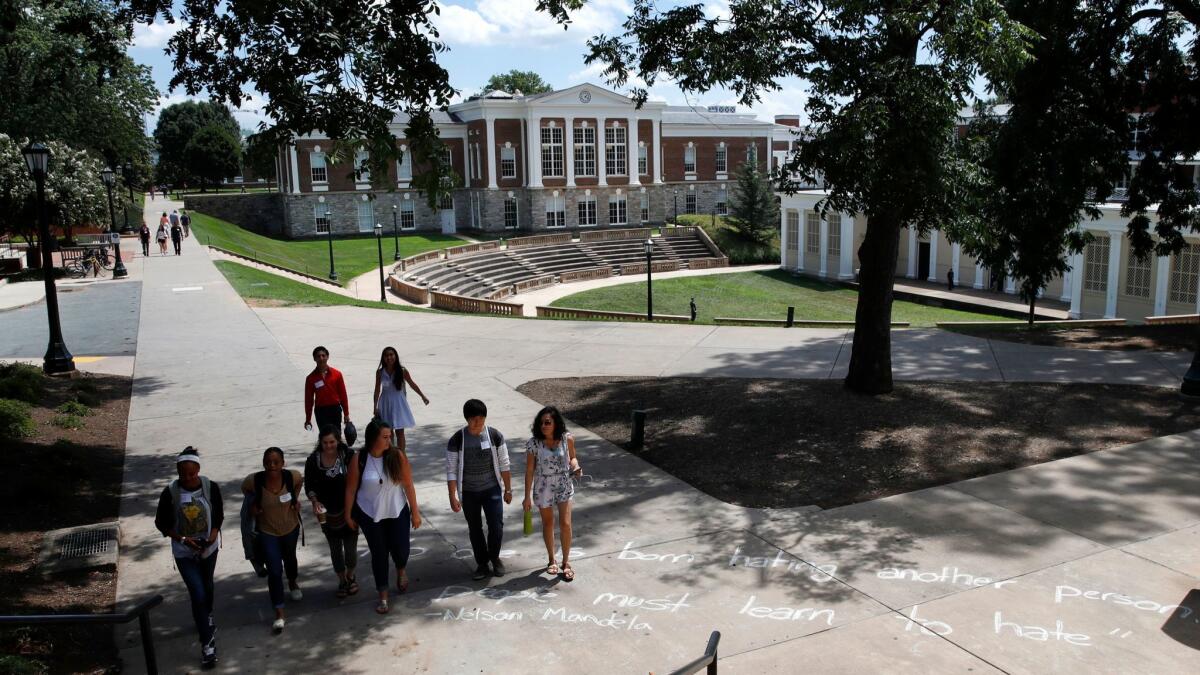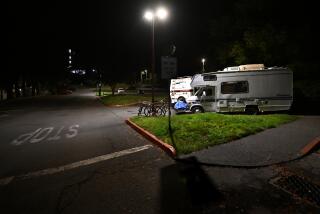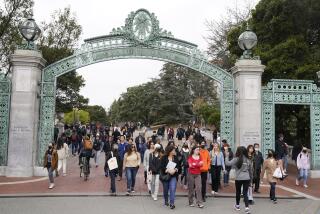Op-Ed: We’re all cupcakes. We all want safe spaces

Nothing makes right-wingers chuckle quite so much as “safe spaces.” Rush Limbaugh and his admirers can’t get over the idea that college students, whom they see as the most pampered beings in the universe, need special zones where they can clump together based on gender or race or sexual identity and feel secure. Snowflakes! Cupcakes!
I chuckle a little too. Then I consider the fraternity houses at my university. I conjure up a room full of guys, mostly white. They’re lounging on well-worn couches; two or three (or 10) of them are cradling a beverage; “SportsCenter” is on. No one is discussing sexual harassment or white privilege. No one is questioning the pleasures of watching the NFL. Would it be wrong to call the frat house a safe space?
University campuses are full of safe spaces that don’t advertise themselves as such. Sorority sisters can be themselves in their parlors. (Here in the South, we still have parlors.) Basketball players are unapologetically who they are in the locker room. The staff of the university newspaper forms a cohort with its own canons of behavior and speech. When such groups assemble in this room or that, what are they creating but safe spaces?
These safe spaces are everywhere. When I go to Boston, where I grew up, I want to hang out with my old friends. They’re all a lot like me. In what other group can I spend an hour comparing the prowess of Ted Williams with that of Carl Yastrzemski? I will not forget to mention that I was there at Ted’s last game. I will probably mention it twice. I’ll be comfortable. I’ll feel at home.
Would it be wrong to call the frat house a safe space?
Home is the ultimate safe space. As a Robert Frost character says, it is “the place where, when you have to go there/They have to take you in.” When we seek a safe space, what are we trying to do but reproduce the conditions of home at its best?
It is possible that safe spaces — where we don’t have to explain ourselves, where we aren’t too careful — are particularly necessary in America. There is a lot of variety here. We are different by taste and temperament, by wealth and status, by region and religion. And we are different by race.
Some of our clumping together, our quest for safe spaces, seems to be based on a wish to be with our own racial group, if only for a while. At the average college, you can find a black student union, an Asian students association, a center for Chicano studies and so on. A student who wanted to found a white student union at Towson State was informed, rather illuminatingly it seems to me, that safe spaces for white students are to be found all over campus. (See fraternities, see sororities.) He might also have been told that most of the country is something like a safe space for white people.
We Americans are highly conscious of the need for tolerance and diversity. One of the worst things you can be called in the U.S. is racist. And yet the proliferation of safe spaces, so often marked by segregation, suggests that integration may not be as easy as we think.
Seeking a genuinely inclusive democracy in which all sorts of people mingle freely and more or less happily all the time is the most laudable of political goals. But I think some of us believe this goal to be easier to attain than it is. Any hint of racial or ethnic insensitivity calls forth radical exasperation. How could he be such a Neanderthal? How could she be such a fool? The assumption is that living together in harmony requires only that we overcome what Freud called the “narcissism of minor differences.” And that’s not hard, is it?
But the desire for safe spaces testifies to something else.
All over the world, we see people taking risks so that they can live with their “own.” We see it with the Kurds, who have been warring for decades to achieve statehood. We see it with the Catalans who want to rebel against Spain to achieve their independence. It is odd but true: Progressives tend to support these imperatives for self-determination. Yet here in America any hesitation about fully mixing and mingling can be met with progressive rancor and sometimes rage.
The hunger for safe spaces, especially of the racial variety, should remind us what a difficult task it is to achieve the comity and community we seek. The solution isn’t to end the quest for democratic equality, fraternity and sorority. It isn’t to leave it to some mixed-race future demographers see coming. Rather, it seems to me we might start moving in two directions, the better to get to a better tomorrow.
The first is accepting that the task is not always easy. The second is to not grow apoplectic every time someone carelessly smudges the borderline of racial (and gender and ethnic) propriety. Barking the word racist whenever a person fails in this enterprise is not the best response. Instruction, dialogue and kindness are far better.
It is absurd to think that perfect harmony between all the many groups that constitute our society can be achieved by next week. This is a great experiment. There has never been a truly egalitarian multi-racial democracy of our size in the world. It’s a magnificent goal. It’s worth approaching in a way that’s both modest and determined.
In the meantime, we all may need to repair to our safe spaces now and again, though never without the hope that at some time in the future, the sooner the better, we will no longer need them at all.
Mark Edmundson teaches English at the University of Virginia, in Charlottesville.
Follow the Opinion section on Twitter @latimesopinionand Facebook
More to Read
A cure for the common opinion
Get thought-provoking perspectives with our weekly newsletter.
You may occasionally receive promotional content from the Los Angeles Times.






